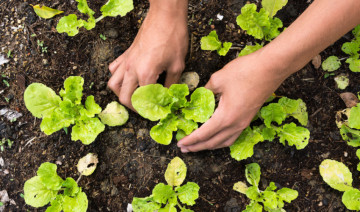
Tips For Planting Your Garden
Chances are, if you haven’t started planting already, you’re at least thinking about getting your hands dirty. We’ve assembled a few tips for you to consider before coming in and picking up your supplies.
Plan first and shop later
- When thinking of what you’d like to grow, be sure to choose plants that grow best in your region.
- Take a stroll in the area where you’d like to start and make sure it provides the necessary space and sunlight to suit your needs.
- A word about size: consider the quantity that you need to grow. You don’t want your garden to be too large; otherwise your hobby may quickly turn into a chore.
Layout choices
- Rows are best used for tall plants such as corn, but most vegetables can be grown in this manner.
- Hills are used when seeds are grouped in clusters. This is suited for wider, outward growing plants such as pumpkins and other varieties of squash.
- Wide beds are used for a number of vegetables and are usually about 3 feet wide. The seeds can simply be broadcasted over the bed rather than in an even line. Lettuce, carrots, spinach are well suited in this layout.
- If you can’t go wider, go upwards! In narrow areas, use support structures to vertically grow such things as peas, pole beans, squash and even melons. You’ll have more room on the ground for your potatoes, onions, and more!
Weeds and pests
Should your choice be organic or not, there are a lot of options here. Consider how much time you have to spend in your garden before deciding which is best for you.
- There are chemical remedies for weed control, or greener options such as simple mulch, black plastic and old fashioned weeding.
- Pest can be controlled with chemicals as well, though there are organic solutions for this too. The most popular organic choice is diatomaceous earth, which consists mostly of fossilized diatoms (a type of hard-shelled algae that acts as an irritant to insects). Diatoms scratch into the insects’ exoskeletons and cause them to dehydrate and die.
- Regardless of how you choose to control weeds and pests, a good rule of thumb is to keep a close eye on your crops. Get to know them and visit them daily if possible. A vigilant eye can do wonders in preventing problems before they get out of hand.
Plants have a schedule too, you know
Your garden can’t be planted in one day. Some varieties will grow better earlier in the season and others will require warmer weather. Plan ahead and you can maximize the best use of your space. You may be able to harvest a couple crops from the same section throughout the growing season.
Now that you’re ready to get started, why not stop in and we’ll be happy to assist you with all of your gardening needs. If you still aren’t convinced you’d like to get your hands dirty, we’ve got gardening gloves too!
